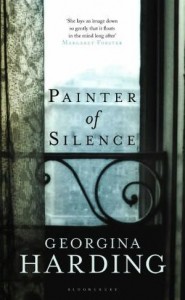painter of silence
Georgia Harding’s Painter Of Silence is a quiet book. Set in twentieth century Romania, the central figure of the story says nothing. He is ill and is brought to hospital. He is mute and deaf. Adriana, a sister on the ward, names him Ioan, after her son who went missing during the war.
But he is not Ioan. A nurse, Safta, knows this. She tells nobody that he is Augustin. They grew up together. He was the son of a girl who had helped out at Safta’s family homestead. Safta knows that he can draw. She gives him paper and pencils.
The two characters gradually remember their childhood. The two shared a close bond, Safta remembers that even before she could talk, she knew him. She ‘had come to know him with a quick intuition as if he was the silent side of herself.’
They shared a happy childhood until Safta’s family flee their house at the start of World War II. A wealthy family, all that they have known for generations is ripped to shreds by the advent of Communism in Romania. The diminishment of the family’s grandeur is marked when Safta’s grandfather shoots a horse in the stable because he doesn’t want the Russians to get it.
The family is dislocated from their home. Augustin remains and watches the ravages of war. Soldiers come to the property, he sees death.
Safta takes Augustin home with her from the hospital as he recovers. Through illustrations Augustin reveals the trauma of the war, and the stark reality of his loneliness. Augustin is clearly distressed and can only console himself with the thought that ‘the pictures will dissolve in the end if he is calm.’
Despite the power of Harding’s prose, as the events are recounted, the reader is so isolated from the full extent of their impact. The voice that tells the story is Safta’s.
What interested me most about the book is the personal story of communism’s spread. So often grand narratives of history and politics relegate the experiences of those captured within particular regimes. There are similar books which personalise the growth of an ideology, similar to Harding’s treatment of Romania. Barbara Demick’s (non-fictional) Nothing to Envy tells the stories of several North Koreans and their experience of the communist regime, and Brian Caswell and David Chiem capture the installation of communism in Vietnam in Only the Heart. Harding has produced an important and poignant addition to this genre.
Painter of Silence was shortlisted for the 2012 Orange Prize.


